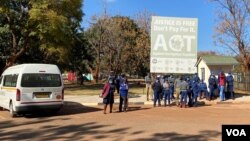President Emmerson Mnangagwa’s ruling party has dismissed as “rubbish” a statement by Western diplomats warning Zimbabwe’s government not to use the COVID-19 pandemic as a pretext to stifle citizens' rights.
The statement was delivered while more than a dozen citizens are in hiding for fear of persecution or prosecution for organizing an anti-government protest.
Seven countries, including the U.S., have urged Mnangagwa to keep the inauguration pledge he made in 2018 to respect human rights. Western diplomats joined forces in a statement saying their countries would continue to assist Zimbabwe in addressing the humanitarian crisis caused by recurring droughts and the COVID-19 pandemic.
“But COVID-19 must not be used as an excuse to restrict citizens’ fundamental freedoms. Freedom of the press, of opinion, of expression, and of assembly are all universally recognized human rights and are guaranteed by the Zimbabwean constitution. The government also has a responsibility to investigate and prosecute those responsible for violating human rights,” said the seven embassies in their diplomatic message.
Zimbabwe’s Information Minister Monica Mutsvangwa said Saturday the government would not comment on the group's statement by the U.S., Germany, Poland, Britain, Canada, Norway and the Netherlands.
Tafadzwa Mugwadi, a spokesman for Zimbabwe’s ruling Zanu-PF party, dismissed the statement by Western diplomats.
“This is just a piece of rubbish. Nothing new except the usual rhetoric from culpable players whose hand has always been visible as far as disturbances in this country are concerned. Under what circumstances or basis do they have to instruct the government or people of Zimbabwe to stop from blaming them? How are they immune when they are equally blaming the government? They are blaming a government on whose neck they imposed these illegal sanctions. It’s just a bunch of nonsense,” Mugwadi said.
Zimbabwe’s political opposition and rights groups say Mnangagwa is moving away from his promise not to follow the playbook of his predecessor, long-time leader, the late Robert Mugabe, whose 37-year rule was littered with human rights abuses.
The head of Human Rights Watch in southern Africa, Dewa Mavhinga, says the government must investigate the claims instead of dismissing them.
“This is very important that the Zimbabwe government demonstrates that it respects human rights. Without this demonstration for respect for human rights, all efforts to revive the economy, for international re-engagement, will be wasted because no one wants to do business with a country that does not respect rights, a country that brutalizes its own citizens, a country that looks the other way when there are obvious cases of abductions and torture of citizens by state agents,” Mavhinga said.
A hashtag #ZimbabweanLivesMatter is trending on social media, but the government insists there is no crisis.
Rights groups and the opposition say the government is looking for a number of pro-democracy activists who are in hiding, saying they fear being arrested for organizing an anti-government protest, which security forces thwarted in July.
Journalist Hopewell Chin’ono and opposition leaders Jacob Ngaruvhume and Job Sikhala are in prison on charges of stoking violence ahead of the march against poverty and corruption, which was to take place July 31.
Earlier this month, South Africa, which is the current chair of the African Union, sent envoys to engage with both the government of Zimbabwe and relevant stakeholders, to “identify possible ways in which South Africa can assist Zimbabwe.” However, they left after meeting only with President Mnangagwa.




